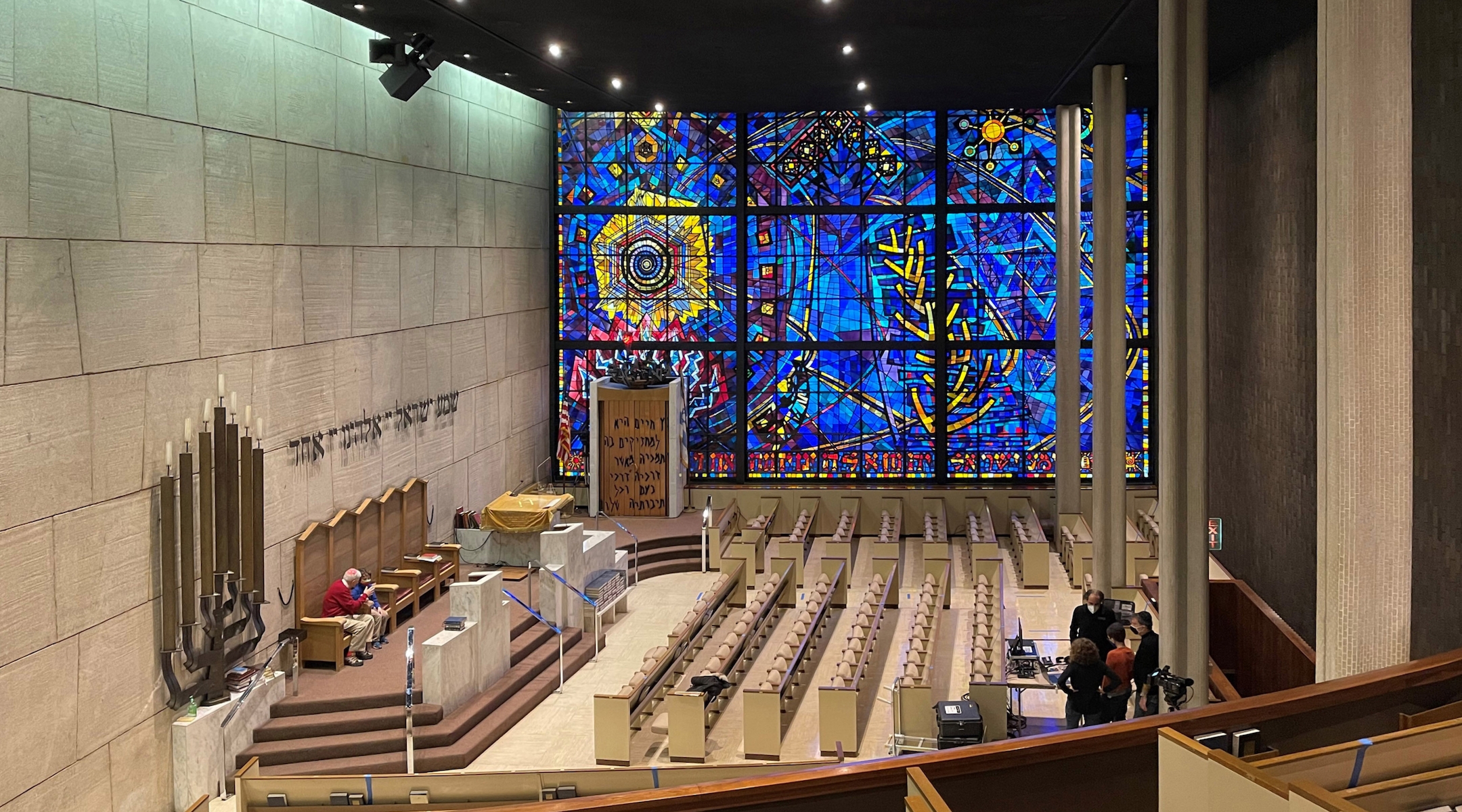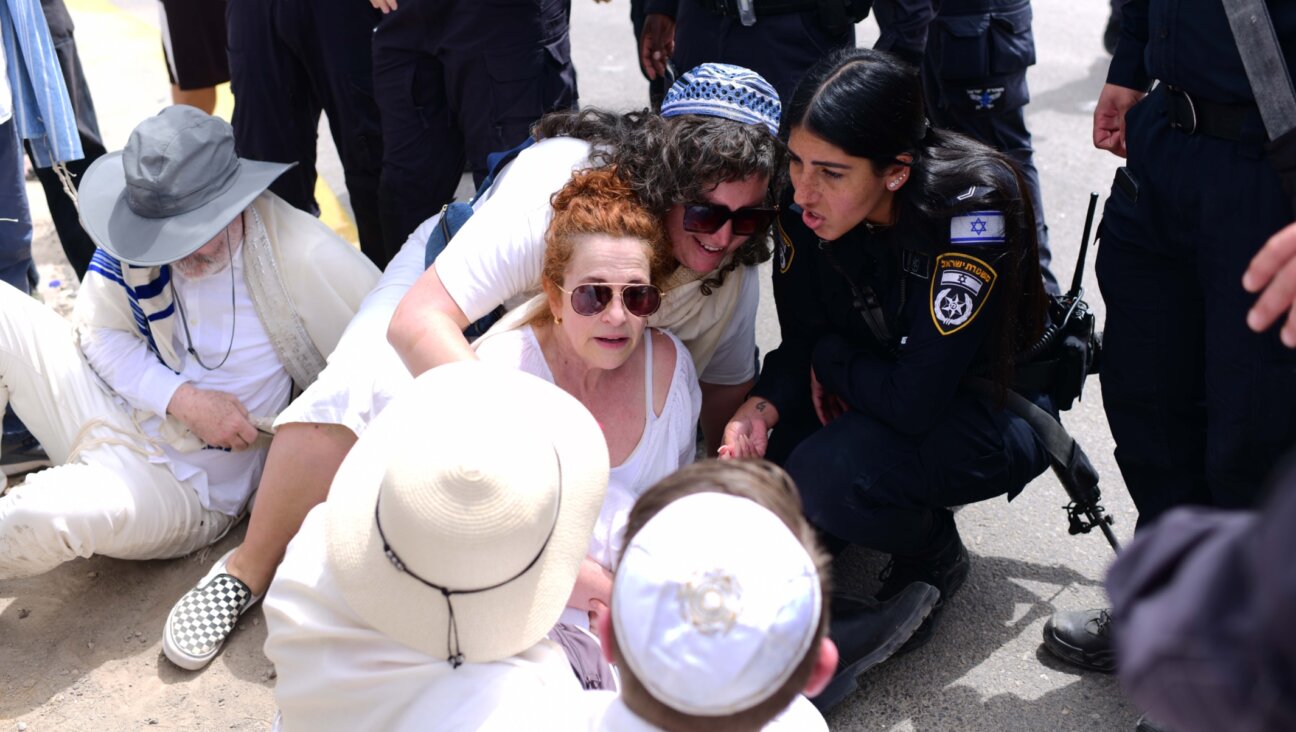With COVID’s resurgence ahead of the High Holidays, some synagogues are bringing pandemic guidelines back. But for most, it’s ‘business as usual.’

The expansive interior of the Chicago Loop Synagogue is conducive to social distancing. (Paul Harding/FAIA)
(JTA) — For synagogues across the country, it’s becoming a standard part of preparing for the High Holidays: Set up extra seating in the sanctuary. Make sure the shofars are in order. Take out the Rosh Hashanah and Yom Kippur prayer books.
And figure out what, if anything, to do about COVID-19.
As Jews worldwide approach their fourth High Holiday season following the emergence of COVID, a resurgence of infections has forced the illness back into headlines and congregational planning meetings. But by now, rabbis say, they’re used to it — and several told the Jewish Telegraphic Agency that rising case rates are not upending their plans for Rosh Hashanah, which begins Friday night and promises crowded synagogues nationwide.
“We’re trying to keep ourselves healthy, but it’s business as usual,” said Mara Nathan, the senior rabbi at Temple Beth-El, a Reform synagogue in San Antonio, Texas. Daniel Weiner, rabbi of Temple De Hirsch Sinai in Seattle, said of his Reform congregation, “We’re just trying to move on with our lives.”
The latest concerns about COVID have been driven by a new variant, known by the name Pirola, which has caused an uptick in cases and hospitalizations across the United States. The Centers for Disease Control and Prevention concluded that the variant “may be more capable of causing infection” among people who have had COVID or been vaccinated, though the risk of serious illness remains low. On Monday, the Food and Drug Administration approved a new booster shot that will soon be available.
But for many communities, the recent wave of cases is merely a sign that COVID-19 has become endemic and will transition into a seasonal illness like the flu, which has its anticipated but manageable spikes.
As it did last year, Temple De Hirsch Sinai will offer an online streaming option for those who wish to stay home, but otherwise will not be instituting any COVID guidelines. Weiner said he has encouraged his community to use common sense and respect in deciding whether to attend services in person.
And at Kehillat Etz Chayim, a Modern Orthodox congregation in suburban Detroit, masks will be available and the community has been told to test if they are not feeling well. Rabbi Asher Lopatin, who leads the synagogue, said this year’s COVID surge “surprised us a little bit,” and that if it had hit Michigan sooner there may have been more precautions in place.
“I think if we had a few more weeks of it, we’d be stricter than last year,” he said.
At the Chicago Loop Synagogue in that city’s downtown, president Lee Zoldan said the building’s architecture lends itself to the “podding” and social distancing that were recommended during the pandemic’s most severe stages. The synagogue features a 535-seat, three-story-tall sanctuary, and the synagogue has a longstanding custom of having attendees sit in small groups by family.
Zoldan said that the synagogue is considering limiting the number of people allowed on the bimah, the stage from which services are led. She added that masks and hand sanitizer will also be available for optional use.
“We really feel pretty safe,” Zoldan told JTA, adding that she has not heard much anxiety from community members about COVID.
Some synagogues, such as Congregation Beth Sholom, a Conservative synagogue in Teaneck, New Jersey, and Congregation Beit Tikvah, a Reconstructionist synagogue in Baltimore, are providing mask-only sections for congregants. Beth Sholom regularly has masked sections at its services, and offered an outdoor service during High Holidays last year.
IKAR, Los Angeles’ progressive nondenominational congregation, will be conducting services both inside and outside this year as well, weather permitting. IKAR’s outdoor service will have a mask-only section.
One community that continues to abide by stricter health guidelines is Shir Hamaalot, a volunteer-led congregation in Brooklyn that describes itself as “traditional-egalitarian.” At its Rosh Hashanah service on Friday, Shir Hamaalot is requiring masks. Any service leader who is unmasked will have to test negative that day.
Russ Agdern, a member of the community’s organizing team, told JTA that the congregation has been one of the few that has maintained masking and other pandemic precautions since it reintroduced in-person services. Shir Hamaalot’s Rosh Hashanah registration form references “the dearth of in-person COVID-cautious High Holidays options in NYC” as a reason for its decision to maintain the protocols.
“We have community members that are high risk for COVID, immunocompromised, have long COVID, or have family members or loved ones who fit those descriptions,” he said. Using the Yiddish word for praying, he added, “Being an inclusive community that provides folks a safe place to daven is important to us.”
This article originally appeared on JTA.org.

I hope you appreciated this article. Before you go, I’d like to ask you to please support the Forward’s award-winning journalism this Passover.
In this age of misinformation, our work is needed like never before. We report on the news that matters most to American Jews, driven by truth, not ideology.
At a time when newsrooms are closing or cutting back, the Forward has removed its paywall. That means for the first time in our 126-year history, Forward journalism is free to everyone, everywhere. With an ongoing war, rising antisemitism, and a flood of disinformation that may affect the upcoming election, we believe that free and open access to Jewish journalism is imperative.
Readers like you make it all possible. Right now, we’re in the middle of our Passover Pledge Drive and we still need 300 people to step up and make a gift to sustain our trustworthy, independent journalism.
Make a gift of any size and become a Forward member today. You’ll support our mission to tell the American Jewish story fully and fairly.
— Rachel Fishman Feddersen, Publisher and CEO
Join our mission to tell the Jewish story fully and fairly.
Only 300 more gifts needed by April 30






















